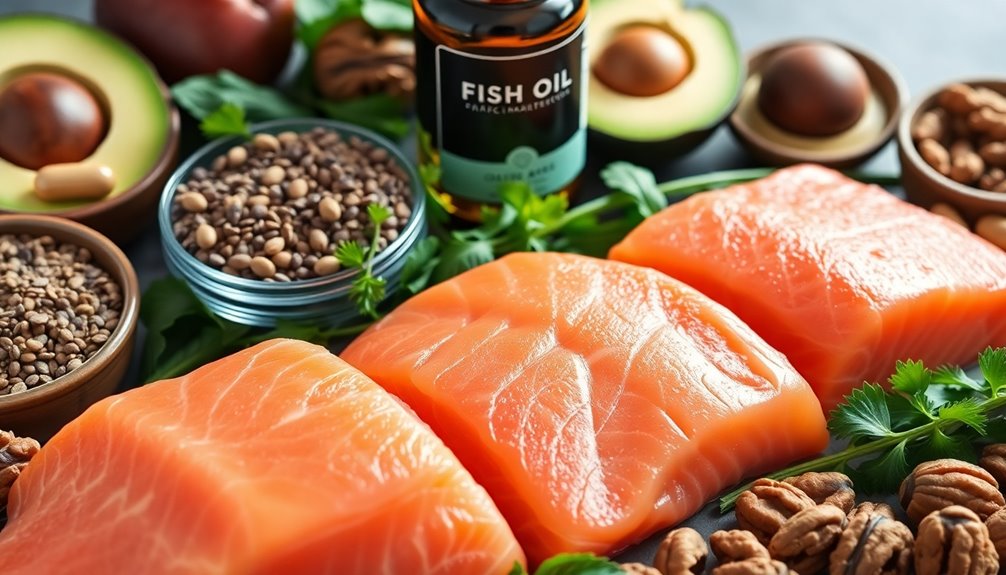To get the best omega-3s, incorporate fatty fish like salmon, mackerel, and sardines into your meals. If you're not a fish eater, consider fish oil or algae supplements that provide essential EPA and DHA. For plant-based options, flaxseeds, chia seeds, walnuts, and hemp seeds are excellent sources of ALA. Aim for 250-500 mg of combined EPA and DHA daily, and always choose reputable brands if you opt for supplements. Consulting with a healthcare professional can help you find the right dosage. There's a lot more to discover about effectively integrating omega-3s into your diet!
Key Takeaways
- Fatty fish like salmon, mackerel, and sardines are rich in EPA and DHA, making them top marine sources of omega-3s.
- Fish oil supplements offer a convenient alternative for those who do not consume fish.
- Algae supplements provide EPA and DHA, catering to vegan dietary preferences.
- Plant-based sources like flaxseeds, chia seeds, and walnuts are excellent for obtaining ALA, a type of omega-3.
- Look for reputable omega-3 supplements with third-party testing to ensure purity and potency.
Health Benefits of Omega-3s

Omega-3 fatty acids are renowned for their numerous health benefits, with research showing that incorporating them into your diet can greatly improve your overall well-being. One of the most compelling reasons to add omega-3s to your meals is their ability to combat inflammation. Chronic inflammation is linked to various health issues, including heart disease and arthritis. By increasing your intake of omega-3s, you can help reduce this inflammation, promoting a healthier body and enhancing your quality of life.
In addition to their anti-inflammatory properties, the cognitive benefits of omega-3s are worth noting. Studies suggest that these fatty acids play a significant role in brain health, supporting functions such as memory and concentration. If you're looking to sharpen your focus or reduce the risk of cognitive decline as you age, omega-3s could be an essential component of your diet.
Moreover, incorporating omega-3s can foster a sense of belonging within your community. Many groups advocate for healthier eating habits, and by joining them, you not only enhance your own well-being but also encourage others to do the same. Sharing meals rich in omega-3s can create a supportive environment where everyone benefits. Additionally, a diet high in omega-3s can complement Keto and Paleo diets, which have been shown to improve overall health and promote weight loss.
Top Marine Sources

Incorporating omega-3 fatty acids into your diet can be achieved easily by focusing on marine sources, which are among the richest providers of these beneficial nutrients. Fatty fish like salmon, mackerel, sardines, and anchovies are particularly high in omega-3s, specifically EPA and DHA, which are essential for heart and brain health. Just a couple of servings of these fish each week can significantly enhance your omega-3 intake and support your overall wellbeing. Additionally, ensuring proper glute activation through strength training can further improve your overall health, showcasing how interconnected nutrition and exercise are in achieving optimal performance.
If you're not a fan of fish or follow a plant-based diet, don't worry! Fish oil supplements are an excellent alternative, providing concentrated doses of omega-3s without the need to consume fish directly. These supplements are widely available and can easily fit into your routine.
For those seeking a vegan option, algae supplements are a fantastic choice. Algae are the original source of omega-3s in the marine food chain, and these supplements provide a direct way to obtain EPA and DHA without relying on fish. Algae supplements are becoming more popular, making it easier than ever for everyone to access the advantages of omega-3s.
Best Plant-Based Sources

When it comes to plant-based sources of omega-3 fatty acids, several options can easily boost your intake. If you're looking to enhance your diet with omega-3s without relying on fish, you've got some excellent plant-based options.
One of the top choices is flaxseeds. Just one tablespoon of ground flaxseed packs about 2.4 grams of ALA, a type of omega-3. You can sprinkle it on your morning oatmeal or blend it into smoothies for a nutritious kick.
Chia seeds are another fantastic option, offering about 5 grams of ALA per ounce. They're versatile and can be used in puddings, baked goods, or as a topping for yogurt.
Don't forget about hemp seeds. These omega-3 rich nuts not only contain ALA but also provide a great source of protein and healthy fats, making them a perfect addition to salads or granola.
Walnuts are another excellent source, providing about 2.5 grams of omega-3s per ounce. Enjoy them as a snack, mixed into trail mixes, or tossed into your favorite dishes.
Finally, consider seaweed and algae, which are particularly beneficial if you're looking for a vegan source of omega-3s. Algal oil supplements are also gaining popularity as a concentrated source of DHA and EPA, two essential forms of omega-3s. Incorporating these plant-based options into your meals can help you meet your omega-3 needs while enjoying delicious and nutritious foods! Additionally, a plant-based diet can significantly improve overall health and vitality, making it a great choice for those seeking wellness.
Omega-3 Supplements Overview

If you're seeking to boost your omega-3 intake but find it challenging to get enough from food sources alone, supplements can be a convenient choice. Omega-3 supplements typically come in various forms, including fish oil, krill oil, and algae oil. Each type provides essential fatty acids—EPA and DHA—that support heart health, brain function, and overall well-being.
When considering omega-3 supplements, pay attention to the supplement dosage. Most health experts recommend a daily intake of 250-500 mg of combined EPA and DHA for top health benefits. However, your specific needs may vary based on diet, lifestyle, and health goals. It's wise to consult a healthcare provider before starting any new supplement regimen.
You'll also encounter various supplement brands that offer omega-3 products. Look for reputable brands that prioritize quality and transparency. Check for third-party testing to ensure the purity and potency of the oil, as this can significantly impact its efficacy. Furthermore, incorporating omega-3s into your diet can complement the positive impact on overall health and well-being that many experience from programs focused on nutrition and exercise.
Additionally, consider the source of the omega-3s; for instance, if you prefer plant-based options, algae oil provides a vegan-friendly alternative.
Choosing the Right Supplement
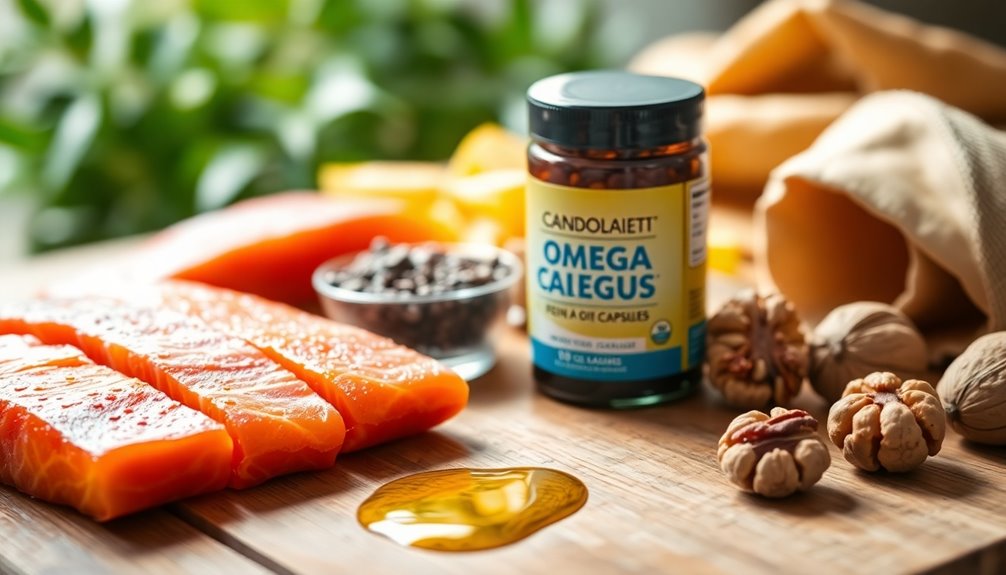
Choosing the correct omega-3 supplement can feel overwhelming, but focusing on a few key factors can simplify the process. With a variety of supplement options available, finding one that fits your needs and lifestyle is crucial. Here are some important considerations to keep in mind:
- Type of Omega-3: Look for supplements that contain EPA and DHA, as these are the most beneficial forms. Fish oil and algal oil are popular sources.
- Purity and Quality: Check for third-party testing to ensure the supplement is free from contaminants like heavy metals or toxins. Reputable brands will often display this certification.
- Form: Omega-3s come in various forms, including capsules, liquid, or chewables. Choose one that you'll be comfortable taking regularly.
Dosage considerations are also essential. While the recommended intake can vary based on individual health needs, starting with a moderate dose and adjusting based on your body's response can be a good approach. It's always a smart idea to consult with a healthcare professional to find the right dosage tailored to your specific requirements.
Recommended Daily Intake
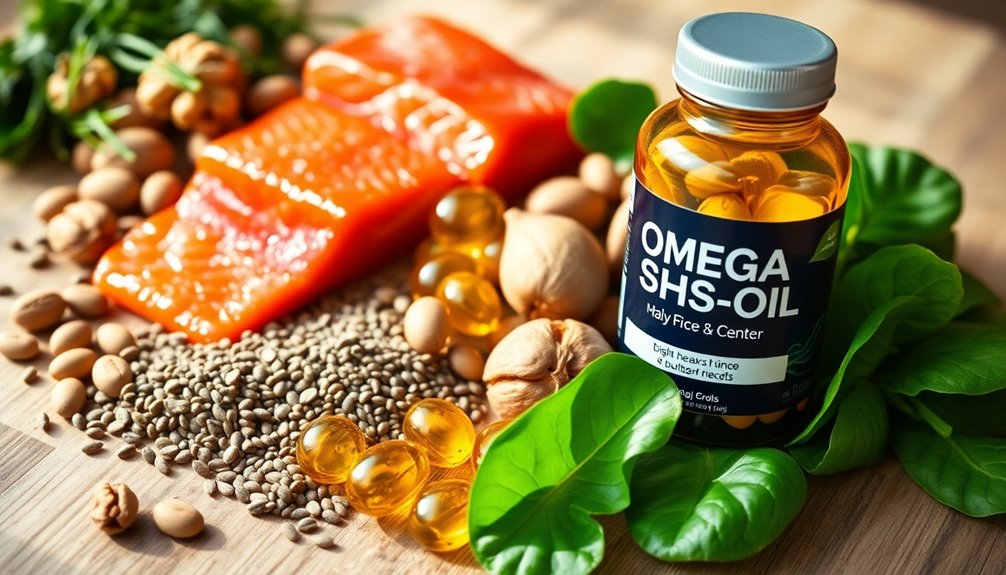
Understanding the recommended daily intake of omega-3s can help you make informed choices about your health. The daily recommendations for omega-3 fatty acids vary depending on factors like age, sex, and overall health.
For most adults, experts suggest a minimum of 250 to 500 milligrams of combined EPA and DHA daily. This dosage is particularly important for promoting heart health and reducing inflammation.
If you're pregnant or breastfeeding, the recommendations increase to about 200-300 milligrams of DHA per day. This is vital for supporting fetal and infant brain development.
If you have specific health conditions like heart disease, your healthcare provider may recommend a higher omega-3 dosage to help manage your symptoms.
It's worth noting that the body can't produce omega-3s on its own, so obtaining them from your diet or supplements is essential. Fatty fish, like salmon and mackerel, are excellent sources, but if you're vegetarian or vegan, consider flaxseeds, chia seeds, or algae-based supplements. Additionally, incorporating whole-food protein sources into your diet can complement your omega-3 intake and enhance overall health.
Before making any significant changes to your omega-3 intake, it's a good idea to consult with a healthcare professional. They can help tailor the recommendations to your individual needs, ensuring you get the right balance for your health.
Cooking With Omega-3 Foods
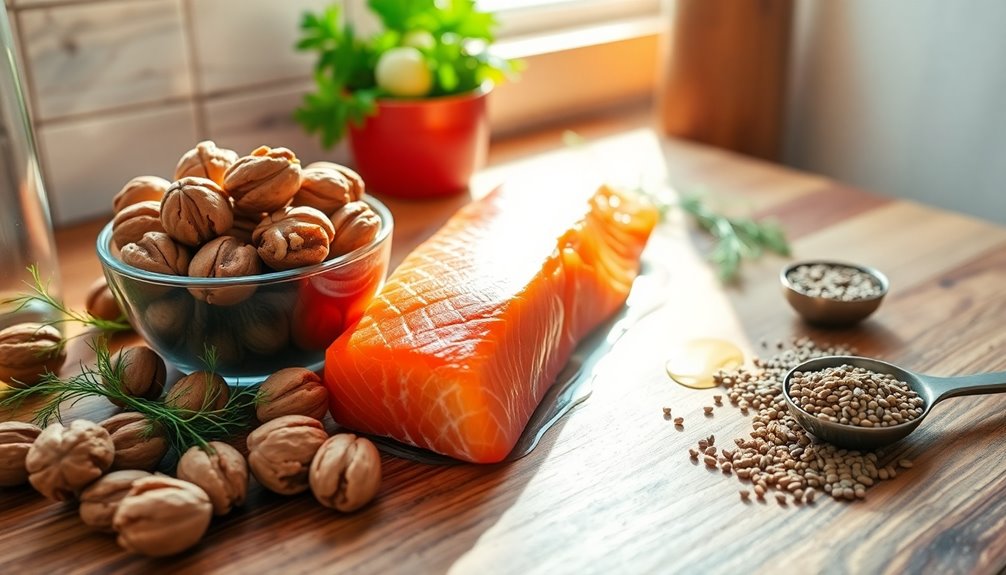
Incorporating omega-3-rich foods into your cooking not only enhances flavor but also boosts your health. You're likely aware of the benefits of omega-3 fatty acids, but you might be wondering how to include them in your meals. The good news is that there are plenty of delicious omega-3 recipes and meal ideas that make it easy to enjoy these nutritious foods.
Start by incorporating fatty fish like salmon, mackerel, or sardines into your weekly menu. These fish are packed with omega-3s and can be grilled, baked, or even added to salads. Here are a few more ideas to help you get started:
- Add flaxseeds or chia seeds: Sprinkle them into smoothies, yogurt, or oatmeal for a nutritional boost.
- Use walnuts: These can be tossed into salads or used in pestos for a unique flavor and texture.
- Experiment with seaweed: This is an excellent plant-based source of omega-3s, and you can add it to soups or salads.
Incorporating these foods into your diet can contribute to your overall well-being, as studies have shown that omega-3 fatty acids can help reduce inflammation and support heart health. When you cook with omega-3-rich foods, you're not just nourishing your body; you're also creating meals that bring people together. Whether you're hosting a dinner party or enjoying a quiet meal with your family, these omega-3 meal ideas can help you foster connection and promote health. So go ahead, get creative in the kitchen, and savor the benefits of omega-3s!
Potential Side Effects
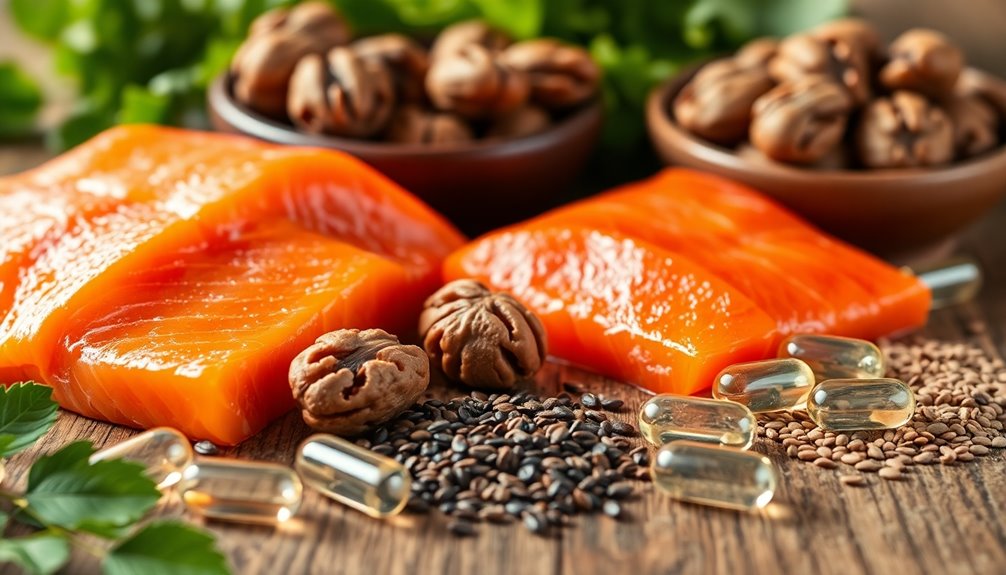
Experiencing the advantages of omega-3 fatty acids can come with some possible side effects that you should be mindful of. While omega-3s are generally deemed safe, there are some risks and precautions to keep in mind.
For example, high doses of omega-3 supplements can result in gastrointestinal problems, such as bloating, diarrhea, or nausea. If you're contemplating increasing your intake, it's prudent to start with smaller doses and observe how your body responds.
Moreover, omega-3s can interact with certain medications, especially blood thinners. If you're on anticoagulant therapy, consult your healthcare provider before incorporating omega-3 supplements into your regimen. This is crucial to prevent any contradictions that could heighten your risk of bleeding.
Another aspect to take into account is the origin of your omega-3s. Fatty fish are generally a fantastic option, but if you're using fish oil supplements, be cautious about the purity and quality. Contaminants like mercury can present health risks, so opt for reputable brands that screen for these substances.
Lastly, while omega-3s can be advantageous for heart health, excessive intake can paradoxically lead to heart rhythm issues. It's vital to balance your consumption and engage in open discussions with your healthcare provider about your specific needs. Additionally, be aware that oxidized cholesterol can contribute to plaque buildup and heart attacks, highlighting the importance of maintaining a healthy diet alongside omega-3 supplementation. By being informed and careful, you can enjoy the numerous benefits of omega-3s while minimizing potential side effects.
Integrating Omega-3s Into Your Diet
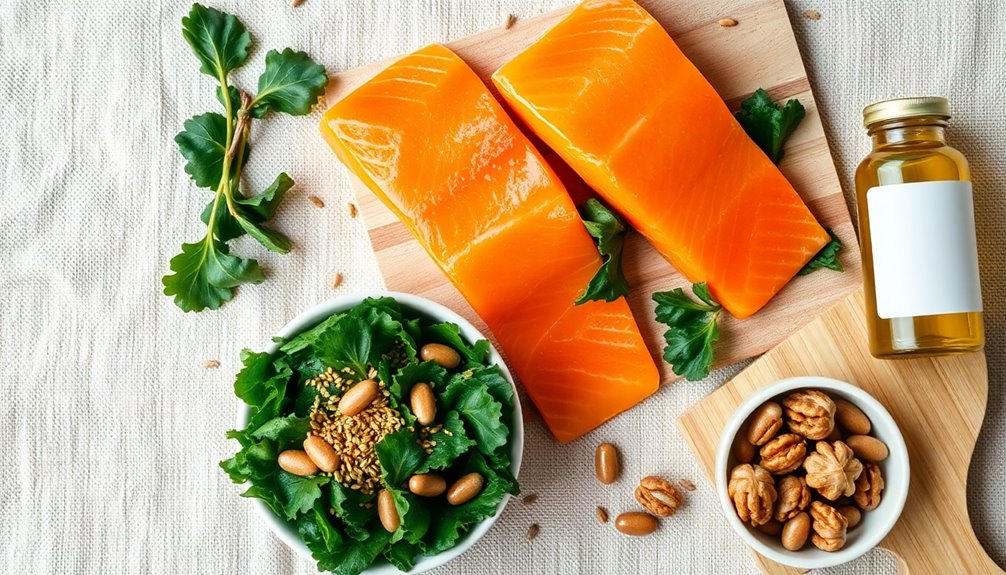
To boost your omega-3 intake, start by adding more fatty fish to your meals, like salmon, mackerel, or sardines. These fish are rich in EPA and DHA, the two essential types of omega-3s your body needs for optimal health. Integrating these into your diet can be simple and enjoyable, especially if you incorporate some meal planning.
When meal planning, think of easy omega-3 recipes that fit your lifestyle. Here are some ideas to get you started:
- Grilled salmon with quinoa and vegetables: A nutritious and satisfying dish that's quick to prepare.
- Sardine salad: Toss canned sardines with greens, cherry tomatoes, and a zesty dressing for a invigorating lunch.
- Mackerel tacos: Use grilled mackerel as the filling, topped with cabbage slaw and avocado for a fun twist.
Don't forget about other sources of omega-3s if you're vegetarian or vegan. Flaxseeds, chia seeds, and walnuts are excellent plant-based options. You can sprinkle these seeds over yogurt, blend them into smoothies, or add them to your baked goods. Incorporating these plant-based diets can also help reduce greenhouse gas emissions and promote a healthier lifestyle.
Frequently Asked Questions
Can Omega-3s Help With Weight Loss or Weight Management?
Omega-3s can indeed play a role in weight loss and management. Research shows that omega-3s can boost metabolism, helping your body burn calories more efficiently. They also support appetite control, making it easier to resist cravings and manage portion sizes.
Are There Specific Omega-3s That Benefit Mental Health?
You might've heard that omega-3s can boost your mental health, but is there truth to it? Research shows omega-3 benefits, particularly EPA and DHA, play a significant role in brain function and mood regulation. These specific omega-3 sources can help reduce symptoms of depression and anxiety.
How Do Cooking Methods Affect Omega-3 Content in Foods?
Cooking methods can impact omega-3 content in foods to a great extent. Frying often reduces omega-3 levels due to high temperatures, while baking generally preserves them better.
When you grill, some omega-3s may be lost as fat drips away, but steaming is more effective for retaining these beneficial fats. Choosing steaming or baking over frying can help you maintain more omega-3s, so your meals aren't just tasty but also nutritious.
Can I Get Enough Omega-3s From a Vegetarian Diet?
Yes, you can get enough omega-3s from a vegetarian diet! While plant-based sources like flaxseeds, chia seeds, and walnuts are great options, they mainly provide ALA, which your body must convert to EPA and DHA. If you're concerned about omega-3 deficiency, consider incorporating algal oil supplements, which offer direct sources of EPA and DHA. Balancing these foods can help you thrive on a vegetarian diet while meeting your omega-3 needs.
Are Omega-3 Supplements Safe for Children and Pregnant Women?
When it comes to omega-3 supplements for kids and pregnant women, you've got to weigh the pros and cons. While they can offer benefits like brain development, there are potential risks, especially with dosage and quality.
It's essential to consult a healthcare professional before starting any supplements. By doing this, you're making sure you're on the right track, ensuring safety while reaping the rewards of omega-3s for your loved ones.
Conclusion
Incorporating omega-3s into your diet can truly enhance your overall health, from boosting heart function to supporting brain health. Imagine savoring a delicious salmon fillet or tossing a handful of chia seeds into your morning smoothie—what better way to nourish your body? Whether you prefer marine or plant-based sources, there are plenty of options to choose from. Prioritizing omega-3s isn't just a choice; it's a step towards a healthier, more vibrant life.

